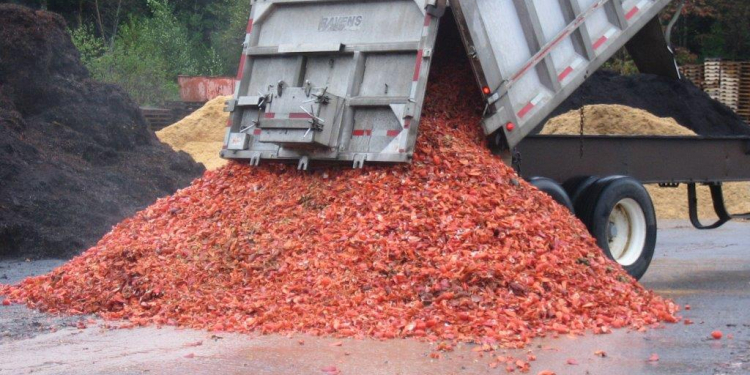A group of farmers and researchers has developed an innovative, sustainable method of tackling a pest that threatens to “annihilate” Scotland’s potato industry within 30 years.
- Potato cyst nematode (PCN) is increasing exponentially and costs the Scottish potato industry £2-3 million a year
- Meanwhile, the range of chemical treatments is increasingly limited, as they are found to be harmful for people or soil
- The RISS farmers and researchers have developed a chitin-rich compost, made from shellfish waste, that is a biocontrol for PCN
- Others in the RISS group, including SoilEssentials, have received Make Innovation Happen funding for soil sampling and monitoring
The group worked with the Soil Association Scotland-led Rural Innovation Support Service (RISS) on a range of ways to manage potato cyst nematode (PCN), which has been increasing exponentially and is estimated to be costing the Scottish potato industry £2-3 million per year.

One of the methods developed by the group, facilitated by Helen Glass of the Scottish Agricultural Organisation Society (SAOS), is a chitin-rich compost. Chitin is a fibrous substance that occurs naturally in shellfish, amongst other species, and acts as a biocontrol for PCN.
Farmer Martin Cessford of arable Whanland Farm, Brechin, developed the compost with others in the group as part of his agribusiness Angus Horticulture and is currently trialling it on his farm. He says: “We’ve applied the compost to a PCN-scheduled field [one that PCN has put out of production] and we’re monitoring the decline of PCN with a research station in Flanders, Belgium. Dr Andy Evans of SRUC got dispensation to use seashells from food waste 12 years ago, and in six years the fields were clear. We know it enhances the flora in the soil, we know it improves the soil, we just need to prove it!

“RISS has helped us get better scientific knowledge and has opened the door to research stations at Harper Adams, Thomas Been in Holland, and we’ve worked with Professor Henry Lyon. Helen Glass has been instrumental and I can’t give her enough credit.”
PCN will annihilate the seed potato industry within 30 years if we don’t get on top of it
Cessford started the group with Mark Clark of Grampian Growers, both of whom have struggled with PCN. “We stopped our daffodil business because of the risk due to PCN,” continues Cessford. “It’s a global problem – it will annihilate seed potato growing within the next 30 years if we don’t get on top of it.
“The chemicals used to regulate PCN in the past are being slowly withdrawn – they’ve been found to be carcinogenic or they don’t help the flora in the soil. They’re either harmful to humans or the soil, so we need to look for alternatives.” Soldier flies are another source of chitin that the group is exploring alongside shellfish.
Facilitator Helen Glass says: “The group was farmer and supply chain-led and I’m proud of how they co-operated, and how Martin and Angus Horticulture grabbed the baton to set up meetings with academics and innovation centres.”
Soil sampling, trap crops and PCN-resistant varieties
The RISS group has also developed work to improve soil sampling, with farmer Jim Wilson of Hilton of Fern, by Brechin, who runs precision agriculture company SoilEssentials. SoilEssentials, Scottish Agronomy and SASA received a Make Innovation Happen grant from Highlands and Islands Enterprise to take and analyse large volumes of soil for PCN. SoilEssentials will extend their existing tools to map the results, to help farmers and agronomists decide what measures to take.
“The industry has known for a while PCN was rising,” says Wilson, “and we were all thinking there had to be a better way of dealing with it. The RISS group was a way of moving the problem forward and making a difference. We knew that unless we got together we would struggle to get traction.
“At SoilEssentials we use high intensity sampling to locate the PCN nematodes – they don’t travel far. It gives us a foundation – unless you know where the problem is and how big it is, you can’t make a plan to tackle it.”
Other RISS group members are working on trap crops, where the nematodes hatch and attach themselves to other plants where they can’t complete their lifecycle, and PCN-resistant potato varieties.
The group has also worked with another RISS group, facilitated by Calum Johnson of SAC Consulting, which has tried to develop an industry-wide strategy to tackle PCN. That group is still working together on a range of solutions, alongside Philip Burgess of Scottish Potatoes.





